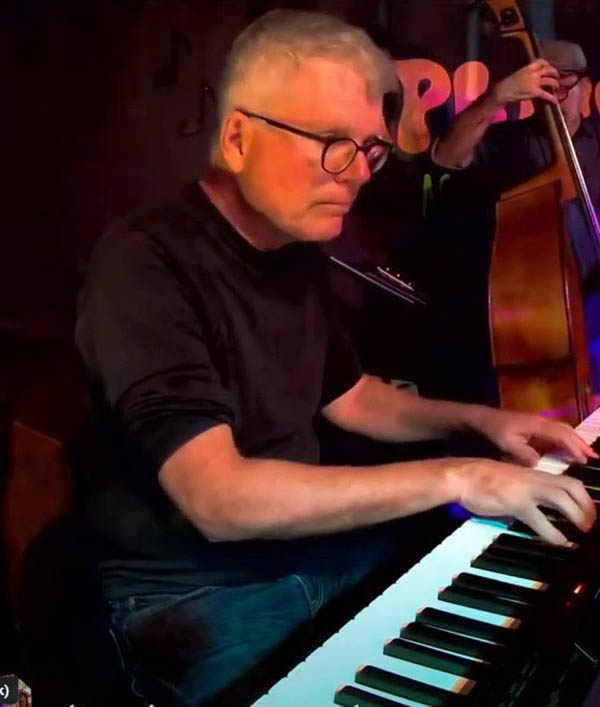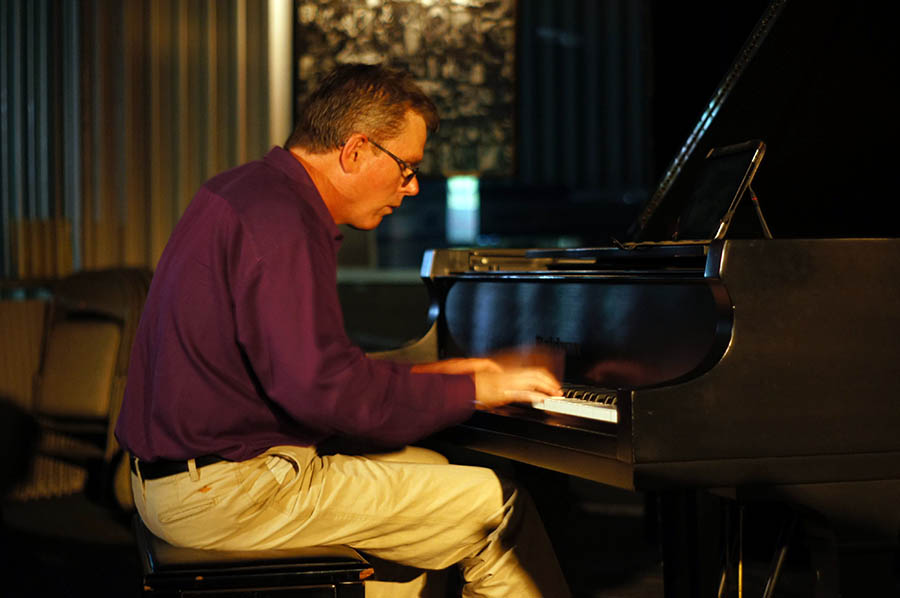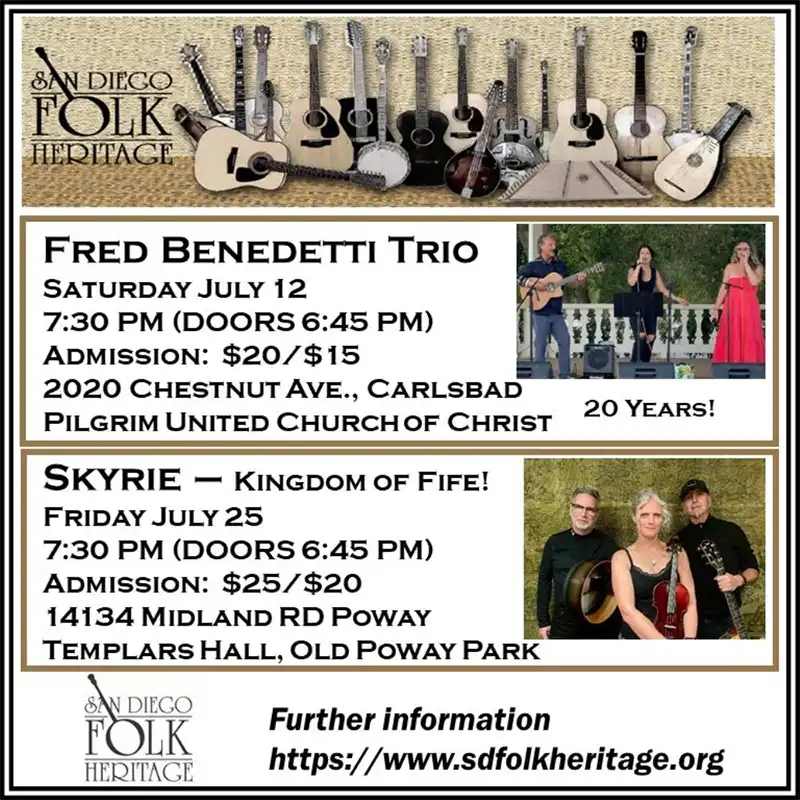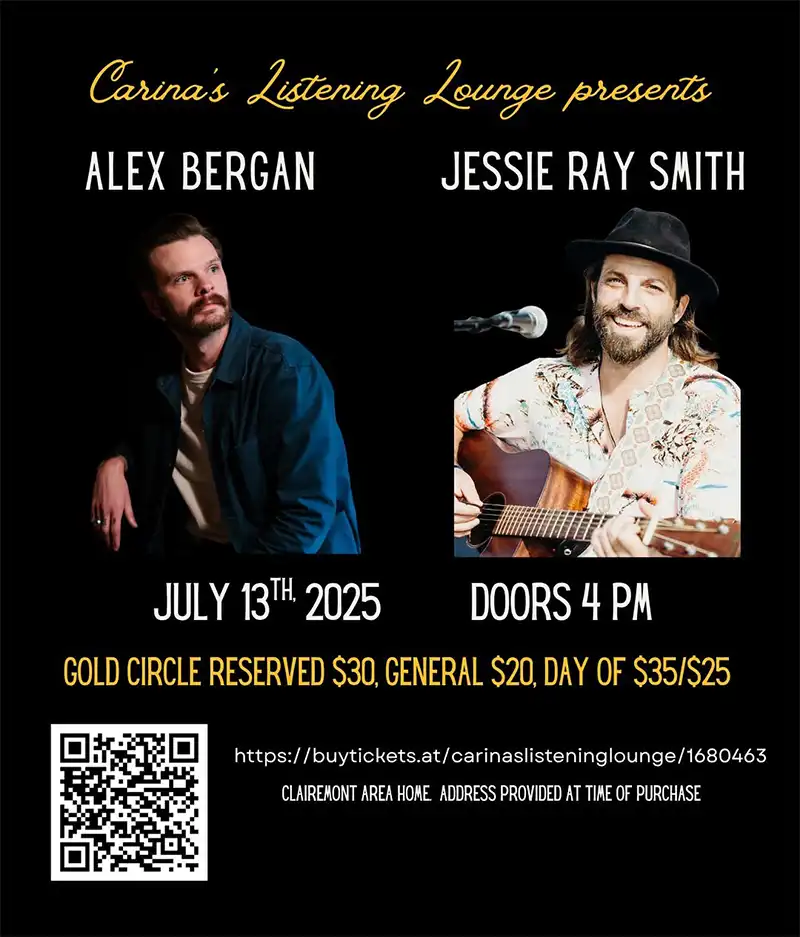Featured Stories
John Opferkuch: Left Brain and Right Brain Working in Harmony

John Opferkuch
Keyboardist John Opferkuch has made a home for himself in San Diego, playing alongside such local jazz heavyweights as Peter Sprague, Matt Hall, and Mark Lessman.
Growing up in Bridgewater, Massachusetts, the notion that he’d be a jazz musician someday wasn’t even on his horizon.
“I grew up pretty working class, very sort of rural, country.”
His parents’ musical taste, and thus his earliest influences, were pretty far away from jazz.
“As a kid, my mother used to listen to the easy listening stations a lot. We drove around in her enormous Chevy and she would listen to that stuff—and I actually really liked some of it. It was standards and relatively hip arrangements. What I remember as a teenager is that she really liked Engelbert Humperdinck, Ray Price, and middle of the road kind of stuff. In the basement, they did have some hip records that caught my ear—they had a Perez Prado record. We had a Chubby Checkers record. But we had no jazz in the house, no classical music in the house.
“My first instrument was a Baldwin ’70s mall organ piece of junk, awful sounding. It had a little rhythm box on it, an octave and a half of pedals.
“I was at a friend’s house when we were about eight or nine, my buddies were all outside playing baseball, but he had one of these little electric organ things with a little book that showed you where to put your fingers to make chords and stuff. By the time they came in from playing baseball, I’d gone through the book and taught myself the basics. His mom called my mom and they bought me an organ.
“I never really liked rock because it doesn’t have that sheen. That was kind of my first inkling that I had an ear for lusher harmonics.”
After buying him the organ, Opferkuch’s parents also signed him up for some lessons.
“The teacher had some borderline hip stuff, like Mancini.”
He said he learned the foundations of harmony and chords “and basic pop stuff.”
Within a few years, Opferkuch had made his first public performance.
“It was an organ recital. I was probably about 10 years old. And if I do say so, I crushed it—I remember that! All the other kids were nervous. I played ‘Beer Barrel Polka’ in my first performance. I went out there with no music and nailed it, and everyone clapped. That was my first inkling that I had a knack for it.
“In my freshman year of high school I was in the band and played really bad clarinet, which is ironic because my son is one of the best clarinet players in the country and plays in the symphony here in town. One of my friends was a drummer and was in the jazz band. I was kind of fooling around with playing Santana tunes, because I was very attracted to the jazz-rock organ sound. I was venturing toward that, and he said, ‘Join a jazz band’ and gave me some jazz records to listen to. He said I should listen to McCoy Tyner—which is a great choice—except being the ’70s, I thought it was like a husband and wife duo, like ‘McCoy-Tyner,’ and I realized, ‘Oh, that’s one person.’

“I would go the library and grab whatever jazz records they had: Miles Davis’ Workin’ and Steamin,’ which had a huge impact on me. They had some good stuff like the classic Bill Evans albums on Riverside Records. The library didn’t have a lot, but what they did have was good. From there, I just started exploring. My mom had a box of all the LPs I had collected. I would just find things randomly that I liked, the Joe Farrell Quartet record with Follow Your Heart. Early on, I became very smitten, a white high school kid in the suburbs, with Chick Corea and the high-gloss fusion, Weather Report.”
Opferkuch did get into the high school jazz band, which led to another important first in his musical career.
“I’m sure we sounded not great. I do remember we played Thad Jones’ ‘A Child is Born,’ and I’m guessing it was a Christmas concert my sophomore year, and it had a little piano solo. For some reason, my high school had a very nice Steinway in the auditorium, so I was playing it in this little hall. This was my first moment playing on a decent piano and hearing how good it can sound.”
Soon afterward, Opferkuch discovered that not only was he pretty good, but he could actually get paid for playing music as well.
“My dad died when I was a little kid. We were in a car wreck. Later on, my mom had a boyfriend who was an Irish county-western singer. I did a gig at a VFW; I had a Rhodes, and I played left-hand bass… we were playing dance music. I remember the gig, but I don’t remember who it was with. I made around $50. I was probably 15 or 16. As I got more into it and started practicing and getting better, there was a crew of about five or six of us who were good players, and we’d just get together and play in various garages. That was the closest I had to being in a band in high school.”
While they didn’t gig, Opferkuch said they worked on playing jazz, from straight-ahead standards to the latest fusion stuff they were hearing. After high school, he was accepted to Yale, where he earned his bachelor’s degree, but only after an interesting side journey.
“I was just a smart guy. And I had the music thing. I was all-state in a jazz band by the time I was a junior in high school.”
However, after his sophomore year at Yale, he decided to attend the New England Conservatory.
“I went to NEC for a year to do the jazz program, then went back to Yale. It was really a stupid thing to do. I loved NEC, and they thought I was transferring. Yale thought I was just taking a year off, and somehow it all worked out. I learned more about music in that one year than I did in four years at Yale by far! The people there were fantastic: Bruce Barth and Joel Weiskopf. So, I studied for a semester with Fred Hersch, who was probably 27 at the time. It was a great year, although I hurt my hand. I was practicing like a demon there, and I woke up one morning and my right wrist was crunching like it had potato chips in there. I had torn a ligament and eventually had it partially fused. A lot of times I sit real low at the piano, and it’s partially because of that. I can’t do push-ups, but I can do pull-ups.”
Back at Yale, Opferkuch developed another interest that ended up leading him to San Diego:

SONY DSC
“When I was an undergrad, I started getting interested in composing and dabbled in concert music. The school I got into that gave me a good deal was UCSD, so I came out here sight unseen in 1987; I did two years, then I left. It wasn’t a happy thing for me. I did meet Jimmy Cheatham, but I didn’t do his jazz thing. I took some lessons from Cecil Lytle, and that was great.
“After UCSD, I stayed in town. I was living in Encinitas with a buddy of mine, and I started freelancing and doing gigs in town, you name it. I was pretty busy doing various and sundry casuals as well as some jazz gigs with Hollis Gentry Jr. at the old Croce’s. This was up through ’92, about three, three and a half years. And it was great; I met Peter Sprague and started playing with him. I also played quite a lot with the older guys, like Frank LaMarca and Gary LeFebvre.
“About then, I decided to move up to LA, I had friends up there. An old friend, a bass player who played with George Russell, had moved to LA and could get me into this cheap rent control apartment. I had no debt and had this cheap little apartment. I could make the rent pretty easily. That was fun. I got to play with Rick Zunigar, the great guitar player. He’s still around. He played with Joey DeFrancesco and used to tour with Stevie Wonder. I did a few gigs with Jeff Berlin, the electric bass player. It was just sort of the random young guy hustling around LA, just doing jam sessions, going to the Valley, and playing a lot of fusion stuff with people.
“I was in LA, off and on, for about four years. When I was up there, there was a hotel up on Sunset, and Charles McPherson called me, so I came in and did the gig. I was playing a lot of fusion; I was maybe 30. The next day Charles calls me up and literally lectured me for almost an hour about how I was on the wrong path in terms of what I was emphasizing in my playing and I wasn’t being melodic. He wasn’t being mean, and I think that was a big trigger for me from then until now; If I’ve gotten better, it’s because of that lecture.
“I played with two Charles Mingus alumni, including McPherson, and I used to play in New Haven with Teddy Charles. He came out of retirement in the 1980s, and we played a lot of gigs in Connecticut and New York. They both had that thing that they are warriors of bebop. They are very similar.”
In Los Angeles, along with his playing gigs, he was offered the opportunity to pick up some computer coding via on-the-job training by another working musician! And he said there’s a surprising amount of overlap between musicians and programmers.
“When you do either at any kind of level, you get good at keeping a lot of threads of possibility and information in your head at once. In music, you’re thinking multithreading while you’re playing, you’re listening and anticipating what you should play next, and reacting to something someone else plays. In software, it’s kind of like that inside out—you need to understand how the pieces work together.”
Since moving back to San Diego, Opferkuch has balanced an active music career with a daytime job as a software developer, a job he said allows him to not put too much stress on his injured wrist.
“Part of my calculus was my wrist: I had to have it partially fused. As a young person, I’m looking ahead, wondering if this thing is still going to let me play when I’m 50 or 60 years old, so I always had in the back of my mind this thought that I had to keep my day gig going just in case. I don’t practice as much as I would if I were a full-timer, but I’ve learned how to practice. If I have something coming up, I’ll buckle down. One thing I’ve learned is to do more with a little less. Mostly, what I’ll practice is working on some Chopin, or taking a tune I like and just grind over it and try to play it. I don’t sit around doing a lot of scales and arpeggios; I’d rather spend that time working on music and my repertoire.”
Opferkuch says he still gigs regularly, averaging three to four jobs a week.
“The scene here in town has gotten way better over the last eight years. There are a lot of young players I’ve gotten to play with. It’s great to be still here and playing. San Diego went into some pretty serious doldrums in the early 2000s, but I think Gilbert [Castellanos] coming down here and doing his thing, and some of these good players coming out of San Diego State, has helped. It’s not New York, but it’s pretty fun.
“When I first got here there were a lot of older cats who are gone now, who really meant a lot to me, including Gary LeFebvre, Frank LaMarco, and Hollis Gentry. And now I’m the old guy.”






